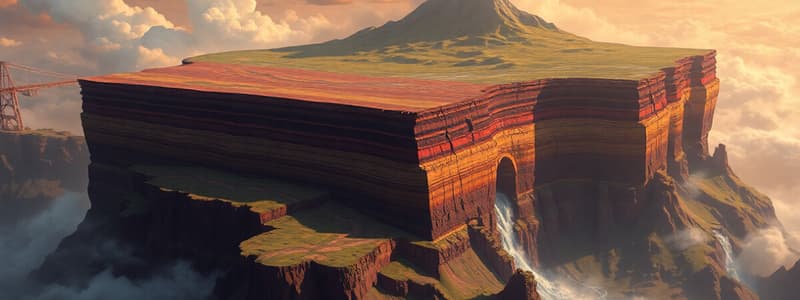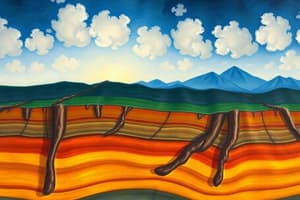Podcast
Questions and Answers
What is the main composition of the inner core?
What is the main composition of the inner core?
- Aluminum and magnesium
- Silicon and oxygen
- Iron and nickel (correct)
- Carbon and sulfur
How thick is the outer core?
How thick is the outer core?
- 1400 miles
- 1800 miles (correct)
- 2000 miles
- 2200 miles
What is true about the temperature as you go deeper into the Earth?
What is true about the temperature as you go deeper into the Earth?
- It decreases significantly
- It remains constant
- It increases gradually (correct)
- It fluctuates widely
What role does convection current play in the mantle?
What role does convection current play in the mantle?
What is NOT a method used by geologists to determine the composition and layers of the Earth?
What is NOT a method used by geologists to determine the composition and layers of the Earth?
What type of material is found in the inner core compared to the outer core?
What type of material is found in the inner core compared to the outer core?
How does temperature variation within the Earth affect its layers?
How does temperature variation within the Earth affect its layers?
Which layer of the Earth is located approximately 1800 miles beneath the crust?
Which layer of the Earth is located approximately 1800 miles beneath the crust?
Which layer of the Earth is known as the hottest, with temperatures reaching up to 5,500 °C?
Which layer of the Earth is known as the hottest, with temperatures reaching up to 5,500 °C?
What is the approximate thickness of the mantle layer of the Earth?
What is the approximate thickness of the mantle layer of the Earth?
Which type of plate boundary occurs when two tectonic plates move away from each other?
Which type of plate boundary occurs when two tectonic plates move away from each other?
What term describes the idea that continents fit together like pieces of a jigsaw puzzle?
What term describes the idea that continents fit together like pieces of a jigsaw puzzle?
Which layer serves as the outermost shell of the Earth that humans interact with daily?
Which layer serves as the outermost shell of the Earth that humans interact with daily?
At which type of plate boundary do two tectonic plates collide?
At which type of plate boundary do two tectonic plates collide?
Which layer of the Earth is primarily liquid and composed of iron and nickel?
Which layer of the Earth is primarily liquid and composed of iron and nickel?
What is the primary composition of the inner core of the Earth?
What is the primary composition of the inner core of the Earth?
What is the lithosphere primarily composed of?
What is the lithosphere primarily composed of?
What occurs during a convergent boundary interaction?
What occurs during a convergent boundary interaction?
Which waves can pass through both solid and liquid mediums?
Which waves can pass through both solid and liquid mediums?
Which of the following describes the asthenosphere?
Which of the following describes the asthenosphere?
What is one evidence of plate tectonics related to fossils?
What is one evidence of plate tectonics related to fossils?
Which discontinuity is the boundary between the crust and the mantle?
Which discontinuity is the boundary between the crust and the mantle?
What type of plate boundary is characterized by two tectonic plates moving away from each other?
What type of plate boundary is characterized by two tectonic plates moving away from each other?
What process describes the movement of tectonic plates sliding past each other?
What process describes the movement of tectonic plates sliding past each other?
What is a characteristic of mountain ranges?
What is a characteristic of mountain ranges?
What is a rift valley primarily the result of?
What is a rift valley primarily the result of?
What best describes fault lines?
What best describes fault lines?
What natural disaster is commonly associated with fault lines?
What natural disaster is commonly associated with fault lines?
Which of the following is a way plates interact at boundaries?
Which of the following is a way plates interact at boundaries?
Which process is NOT associated with the formation of rift valleys?
Which process is NOT associated with the formation of rift valleys?
How do fault lines impact the Earth's surface?
How do fault lines impact the Earth's surface?
What do mountain ranges and rift valleys have in common?
What do mountain ranges and rift valleys have in common?
What primarily causes mountain ranges to form at convergent boundaries?
What primarily causes mountain ranges to form at convergent boundaries?
Which mountain ranges are examples of convergent boundaries?
Which mountain ranges are examples of convergent boundaries?
What is the primary characteristic of a rift valley?
What is the primary characteristic of a rift valley?
Which of the following is a location where rift valleys can be found?
Which of the following is a location where rift valleys can be found?
What type of plate boundary is most associated with earthquakes?
What type of plate boundary is most associated with earthquakes?
What is the definition of a fault line?
What is the definition of a fault line?
What geophysical process is primarily involved in the formation of the Andes Mountain Ranges?
What geophysical process is primarily involved in the formation of the Andes Mountain Ranges?
What type of tectonic activity is primarily related to the San Andreas Fault?
What type of tectonic activity is primarily related to the San Andreas Fault?
Flashcards are hidden until you start studying
Study Notes
Earth Layers
- Inner Core: Hottest layer, solid, composed of iron and nickel, with temperatures reaching up to 5,500 °C.
- Mantle: Widest section of the Earth, approximately 2,900 km thick.
- Outer Core: Located around 2,900 km deep, approximately 2,400 km thick, composed of liquid iron and nickel.
- Crust: The outermost layer where humans live and the most studied; it varies in thickness.
Plate Tectonics
- Convergent Boundaries: Occur when two tectonic plates come together, leading to the formation of mountain ranges.
- Divergent Boundaries: Occur when tectonic plates move apart, forming features like rift valleys.
- Transform Boundaries: Occur when tectonic plates slide past each other, often associated with earthquakes.
Geological Concepts
- Geological Fit: Concept illustrated by continents fitting together like jigsaw puzzle pieces.
- Fault Lines: Long cracks in the Earth’s surface associated with seismic activity.
Electromagnetic Spectrum & Light
- Understanding how different regions of the electromagnetic spectrum function is crucial in applications involving light, mirrors, and lenses.
Seismic Waves
- P Waves: Fastest seismic waves, can travel through solids and liquids.
- S Waves: Slower than P waves, can only propagate through solids.
- Discontinuities: Mohorovicic discontinuity marks the boundary between crust and mantle; Gutenberg discontinuity separates mantle and outer core.
Mountain Formation
- Mountain ranges form at convergent boundaries where continental plates collide, resulting in crumpling and uplifting of the crust.
- Example ranges include the Andes and Sierra Madre.
Rift Valley Formation
- Rift valleys develop at divergent boundaries where tectonic plates move apart, causing land to sink.
- The Red Sea is a notable example of a rift valley.
Earth’s Composition Discovery
- Geologists infer Earth's composition and structure through the propagation of seismic waves.
Performance Assessment
- Students will demonstrate understanding through various assessments, including written works, performance tasks, and a quarterly exam.
Studying That Suits You
Use AI to generate personalized quizzes and flashcards to suit your learning preferences.




